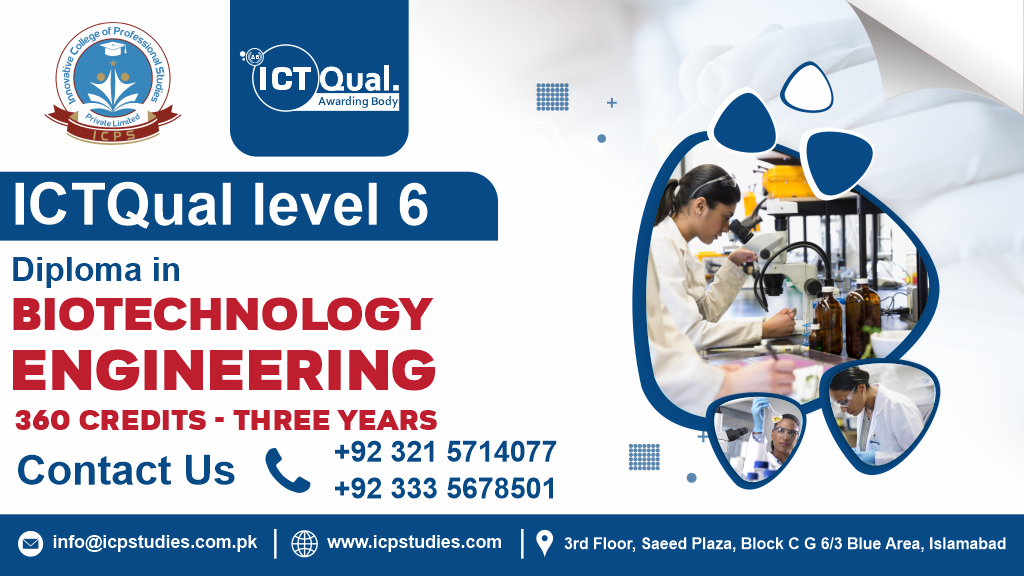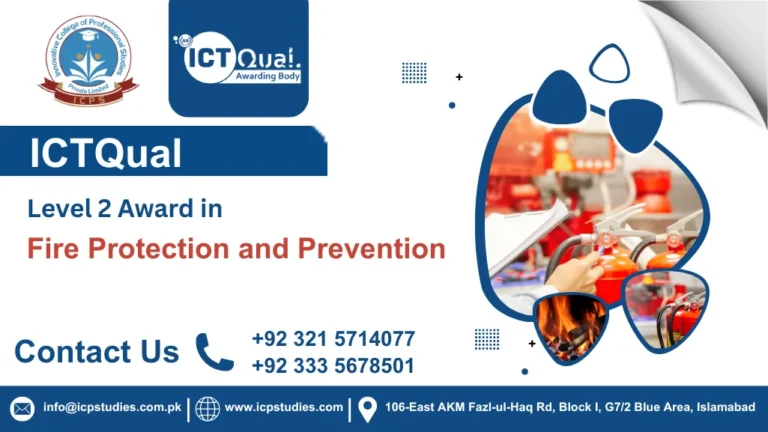The ICTQual Level 6 Diploma in Biotechnology Engineering (360 credits) is a specialized, three-year program designed for individuals seeking to gain in-depth knowledge and practical skills in biotechnology engineering. This qualification equips students with the expertise to innovate and lead in the rapidly growing fields of biotechnology, healthcare, and bioengineering. It is tailored for those who want to combine engineering principles with biological sciences to develop groundbreaking solutions in areas like pharmaceuticals, environmental sustainability, and agriculture.
The ICTQual Level 6 Diploma in Biotechnology Engineering offers a rigorous curriculum that blends theoretical knowledge with hands-on practical experience. Spanning three years, the course covers a wide range of topics crucial to the biotechnology and engineering sectors. Students will gain an understanding of both the scientific and engineering principles behind biotechnology processes, equipping them to design, analyze, and optimize biotechnological systems.
The ICTQual Level 6 Diploma in Biotechnology Engineering offers a unique and comprehensive pathway to expertise in the fast-evolving biotechnology sector. By blending engineering principles with biological sciences, this three-year program provides the knowledge, practical skills, and leadership abilities necessary to succeed in biotechnology engineering. Whether you’re looking to advance your career, specialize in bioengineering, or contribute to global innovations in health and sustainability, this diploma will set you on the path to success in one of the most exciting fields of modern science.
All About ICTQual Level 6 Diploma in Biotechnology Engineering 360 Credits – Three Years
Course Overview
The ICTQual Level 6 Diploma in Automotive Engineering (360 credits) is an advanced, three-year qualification designed to provide students with in-depth knowledge and practical skills in the automotive industry. This program is ideal for individuals who already have a basic understanding of automotive technology and wish to further their expertise in a rapidly evolving field. With a focus on cutting-edge technologies, including electric vehicles, autonomous systems, and sustainable automotive solutions, this diploma equips students with the advanced skills required for leadership roles in automotive engineering.
Throughout the course, learners will explore a wide range of topics, from vehicle design and manufacturing to diagnostics, vehicle dynamics, and materials science. By combining theoretical study with hands-on experience, the ICTQual Level 6 Diploma ensures that graduates are fully prepared to contribute to innovation and advancement in the automotive industry. Whether you aspire to work in research and development, project management, or engineering leadership, this qualification will provide the foundation for a successful career in automotive engineering.
Study Units
- Year 1: Foundation and Core Engineering Principles
- Introduction to Automotive Engineering
- Mathematics for Automotive Engineering
- Physics for Automotive Engineering
- Mechanical Engineering Principles
- Automotive Systems and Technology
- Electrical and Electronic Systems in Vehicles
- Engineering Materials for Automotive Design
- Vehicle Chassis and Suspension Systems
- Introduction to Vehicle Diagnostics
- Manufacturing Processes for Automotive Engineering
- Automotive Environmental Issues
- Health, Safety, and Environmental Management
- Year 2: Advanced Automotive Technologies and Systems
- Advanced Engine Technologies
- Vehicle Dynamics and Handling
- Advanced Automotive Electronics
- Transmission and Powertrain Systems
- Vehicle HVAC Systems
- Vehicle Safety Systems
- Hybrid and Electric Vehicle Technologies
- Automotive Aerodynamics
- Automotive Materials Engineering
- Vehicle Assembly and Production Techniques
- Automotive Diagnostics and Troubleshooting
- Vehicle Testing and Performance Evaluation
- Year 3: Industry Applications, Management, and Innovation
- Advanced Vehicle Design and Prototyping
- Automotive Control Systems
- Automotive Quality Control and Assurance
- Sustainability in Automotive Engineering
- Automotive Project Management
- Automotive Research and Development
- Vehicle Electromagnetic Compatibility
- Automotive Business and Marketing
- Autonomous Vehicles and Future Technologies
- Vehicle Fleet Management and Operations
- Automotive Regulatory Compliance and Standards
- Capstone Project in Automotive Engineering
To be eligible for the ICTQual Level 6 Diploma in Automotive Engineering (360 credits), candidates should meet the following entry requirements:
- Educational Background:
- A Level 5 qualification in Automotive Engineering, Mechanical Engineering, or a related field, or
- A relevant Level 5 Diploma or equivalent qualification in an engineering discipline, or
- A minimum of 2 years of relevant work experience in the automotive industry with a demonstrated understanding of automotive technologies.
- Mathematics and Science Proficiency:
- A solid understanding of basic mathematics, physics, and engineering principles, typically demonstrated through prior qualifications or work experience.
- English Language Proficiency:
- If English is not your first language, you must demonstrate proficiency in English through an accepted qualification, such as IELTS (minimum score of 6.0) or equivalent.
- Motivation and Interest:
- A strong interest in advancing your career in automotive engineering and a desire to gain expertise in advanced technologies such as electric vehicles, autonomous systems, and sustainable automotive solutions.
- Additional Considerations:
- A personal statement or interview may be required to assess your motivation for the course and suitability for advanced study in automotive engineering.
Meeting these entry requirements ensures that students have the foundational knowledge and experience necessary to succeed in the demanding curriculum of the ICTQual Level 6 Diploma in Automotive Engineering.
The ICTQual Level 6 Diploma in Automotive Engineering is designed for individuals who are passionate about advancing their careers in the automotive industry and wish to deepen their knowledge and skills in automotive engineering. This course is ideal for:
- Experienced Automotive Technicians and Engineers:
- Professionals already working in the automotive industry who have a solid foundation in automotive systems and technology. This course will help them gain advanced skills and knowledge to progress into senior technical or managerial roles.
- Aspiring Automotive Engineering Leaders:
- Individuals looking to take on leadership positions in automotive engineering. Whether you’re interested in managing engineering projects, leading R&D teams, or overseeing production processes, this diploma will equip you with the necessary expertise.
- Engineering Graduates:
- Graduates with a background in mechanical or automotive engineering who want to specialize in automotive technologies and stay ahead in an evolving industry, particularly in areas such as electric vehicles, autonomous systems, and sustainable design.
- Individuals Seeking Career Advancement:
- Professionals who wish to enhance their qualifications to pursue higher-level roles in automotive engineering, such as design engineers, project managers, R&D specialists, or system integrators.
- Automotive Entrepreneurs:
- Those looking to start or grow their own automotive engineering businesses or companies, providing innovative solutions in areas like vehicle design, manufacturing, diagnostics, and repair.
- Technology Enthusiasts:
- Individuals passionate about emerging automotive technologies, such as electric vehicles (EVs), autonomous driving systems, and green energy solutions, and want to contribute to the future of sustainable transportation.
If you’re ready to take your career in automotive engineering to the next level, this diploma is perfect for you.
Learning Outcomes
Learning Outcomes for the Level 6 Diploma in Automotive Engineering 360 Credits – Three Year:
Year 1: Foundation and Core Engineering Principles
- Introduction to Automotive Engineering
Understand the evolution and key components of automotive engineering, and identify the roles and responsibilities of engineers within the industry. - Mathematics for Automotive Engineering
Apply advanced mathematical methods to solve engineering problems, with a focus on vehicle systems and technology. - Physics for Automotive Engineering
Demonstrate a fundamental understanding of the physical principles underlying automotive technologies, including mechanics and thermodynamics. - Mechanical Engineering Principles
Apply basic mechanical engineering principles, such as material properties and thermodynamics, in the context of automotive design and manufacturing. - Automotive Systems and Technology
Gain knowledge of key automotive systems, including engines, transmissions, braking, and suspension systems. - Electrical and Electronic Systems in Vehicles
Understand the role of electrical and electronic systems in modern vehicles, including their applications in vehicle control, safety, and efficiency. - Engineering Materials for Automotive Design
Identify and assess materials used in automotive manufacturing and design, and understand their properties in relation to vehicle performance and safety. - Vehicle Chassis and Suspension Systems
Understand the design, operation, and importance of vehicle chassis and suspension systems in ensuring stability, handling, and safety. - Introduction to Vehicle Diagnostics
Develop skills in diagnosing vehicle issues using diagnostic tools and techniques, understanding common vehicle faults. - Manufacturing Processes for Automotive Engineering
Understand key manufacturing processes in automotive engineering, including assembly, welding, and quality control in mass production. - Automotive Environmental Issues
Evaluate the environmental impact of automotive technologies, focusing on emissions, fuel efficiency, and the transition to green technologies. - Health, Safety, and Environmental Management
Apply health and safety principles to automotive engineering, ensuring compliance with industry standards and promoting sustainable practices.
Year 2: Advanced Automotive Technologies and Systems
- Advanced Engine Technologies
Develop an advanced understanding of internal combustion engines, hybrid systems, and alternative powertrains, focusing on performance, efficiency, and innovation. - Vehicle Dynamics and Handling
Analyze the dynamics of vehicle motion, including handling, stability, and the effects of forces on vehicle performance. - Advanced Automotive Electronics
Explore advanced electronic systems in vehicles, including automated systems, advanced driver-assistance systems (ADAS), and infotainment technologies. - Transmission and Powertrain Systems
Understand the design, function, and optimization of transmission and powertrain systems, with a focus on efficiency and performance. - Vehicle HVAC Systems
Understand the design and operation of vehicle heating, ventilation, and air conditioning systems, and their impact on comfort and energy efficiency. - Vehicle Safety Systems
Study the design, implementation, and effectiveness of passive and active vehicle safety systems, including airbags, crash sensors, and collision avoidance. - Hybrid and Electric Vehicle Technologies
Develop expertise in hybrid and electric vehicle systems, including battery technologies, energy storage, and electric drive systems. - Automotive Aerodynamics
Apply the principles of aerodynamics to improve vehicle performance, focusing on fuel efficiency, handling, and stability at high speeds. - Automotive Materials Engineering
Investigate the selection and application of advanced materials in vehicle design, including lightweight and high-strength materials for improved performance. - Vehicle Assembly and Production Techniques
Understand the techniques and tools used in vehicle production, including robotic automation, lean manufacturing, and quality control. - Automotive Diagnostics and Troubleshooting
Apply diagnostic techniques to identify and resolve issues in complex automotive systems, improving vehicle performance and reliability. - Vehicle Testing and Performance Evaluation
Develop skills in testing and evaluating vehicle performance, including fuel efficiency, emissions, safety, and durability.
Year 3: Industry Applications, Management, and Innovation
- Advanced Vehicle Design and Prototyping
Apply advanced design techniques and technologies to prototype vehicles, using CAD, simulations, and rapid prototyping methods. - Automotive Control Systems
Analyze and design control systems used in modern vehicles, including electronic stability control, automatic transmission, and active safety systems. - Automotive Quality Control and Assurance
Implement quality control techniques in automotive production, focusing on defect prevention, process control, and continuous improvement. - Sustainability in Automotive Engineering
Develop sustainable engineering solutions for the automotive industry, including energy-efficient designs and green manufacturing processes. - Automotive Project Management
Manage automotive engineering projects, including budgeting, scheduling, risk management, and team collaboration. - Automotive Research and Development
Contribute to R&D activities in the automotive industry, focusing on the development of new technologies, products, and solutions. - Vehicle Electromagnetic Compatibility
Understand the principles of electromagnetic compatibility in vehicles, focusing on interference and the design of systems to minimize it. - Automotive Business and Marketing
Apply business and marketing principles to the automotive industry, including market analysis, brand development, and sales strategies. - Autonomous Vehicles and Future Technologies
Explore the technologies driving the future of autonomous vehicles, including AI, sensor systems, and the legal and ethical implications. - Vehicle Fleet Management and Operations
Learn the principles of fleet management, focusing on maintenance, logistics, and operational efficiency for managing vehicle fleets. - Automotive Regulatory Compliance and Standards
Understand automotive regulations, including safety standards, environmental compliance, and industry certifications that govern vehicle design and production. - Capstone Project in Automotive Engineering
Apply knowledge and skills gained throughout the course to complete a comprehensive automotive engineering project, demonstrating your ability to solve complex industry problems.
FAQs about ICTQual Level 6 Diploma in Automotive Engineering 360 Credits – Three Years







